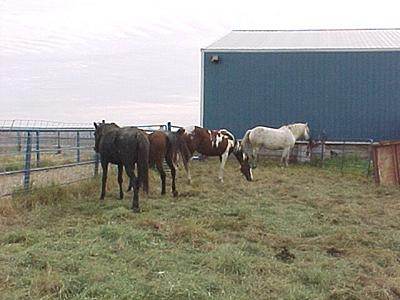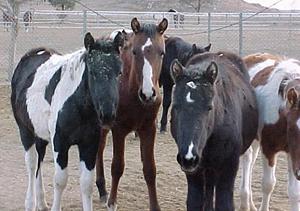|
What is Premarin®?
Premarin (forms include forms include Prempro, Premphase and Prempac) is As the name implies, Premarin is a conjugated estrogen product extracted from pregnant mares' urine (PMU). It is manufactured by Wyeth-Ayerst Laboratories, Inc., and is most commonly prescribed for estrogen replacement therapy (ERT) to relieve hormonal deficiency symptoms associated with menopause or hysterectomy.
The Source
There are approximately 439 producing PMU farms at this time. Each year approximately 75,000 mares are impregnated and line barns with rubber collection cups (urine collection devices; UCDs) fixed into position beneath each mare's tail to catch urine. But the UCD's are not very hygienic for the mares, since it allows their urine to soak the skin cause the urine to soak the skin, which sometimes causes severe infections and painful sores.

Unable to exercise or lie down comfortably or drink adequate amounts of water, they endure severe physical and emotional trauma. USDA inspectors found mares at PMU farms stiff-legged and limping due to the lack of exercise and the constant standing. The overfed, under exercised mares also suffer from "stocking up," hoofwall separation and in some cases, respiratory distress.

They are deprived water so that their urine will be more concentrated.

Normally kept throughout their normal pregnancy of 11 months in stalls just 8 feet long, by 3 1/2 feet wide, by 5 feet high. Just before foaling they are taken "off line" and allowed to foal in outside paddocks. Usually within two weeks of foaling, the mares are bred again and returned to the PMU production line again. Mares that do not become pregnant within a very short time, cannot be returned to the collection barns, and probably will be sent instead to the slaughterhouse.
The mares usually have never been handled or trained so their chances of being rescued is slim but there are some who are lucky.

Rescued PMU Mares
The Byproducts
It is estimated that 50,000 to 80,000 foals a year are the byproducts of the PMU industry. Foals who are removed from the mare, are sometimes fattened, and then sold for slaughter (the Foals of August). (A filly foal has a less than one in 10 chance of not going to slaughter, a colt foal, less than one in 50!)

Rescued PMU Foals

More Rescued PMU Foals
If, after 3-4 months, a filly does not join it's mother on the PMU line or otherwise put to use, it is also likely sent to slaughter. The opposite happens to the stallions/colts. They must be able to impregnate the mares. Many foals are turned over to the killers to be used for slaughter. There are rescue groups in the northern part of the U.S. that try to buy these foals. Some foals are sold privately, some are sold as individuals at auction, and some are still sold in groups, which prohibits rescue efforts. An estimated 50,000 to 80,000 foals delivered by PMU mares are killed annually.

Rescued PMU Foals
Wild horses typically nurse their foals for up to two years before conceiving again. Conceiving and having babies annually is not natural to horses, nor is losing their babies in the first few weeks or months of their lives, long before they are ready to be weaned. Imagine the intense spiritual and psychological trauma for the mothers who are relentlessly separated from their babies year after year. The pain and fear the babies experience at being too soon separated from their mothers and sent to slaughter can only be imagined.

The mares' foals being fattened for slaughter huddle together in the snow on a PMU feedlot.

The final destination for tens of thousands of Premarin foals.
|
|
What to do:
-Educate yourself and others of this process.
-Aware those who use these products of this torture and tell them there are synthetic and plant-based alternatives including:
Herbs such as Dong Quai and Black Cohosh: consult your licensed
alternative healthcare practitioner for details.
Plant-Based ERT currently available in the US: Alora,
Cenestin, Climara, Estrace, Estraderm, Estratab, Estring, FemPatch, Menest, Ogen, Ortho-est, Vivelle and the Vivelle Dot.
-If you see a Premarin ad or commercial alert the magazine or television station of the where the product comes from and state that you will not buy their magazine any longer or watch their station any longer.

Some other facts/news on PMU and Premarin
-The Humane Society of the U.S. has been barred by Wyeth-Ayerst from inspecting the PMU farms.
-Project Equus, a horse protection group, reports that a 1996 Canadian study found that in one herd of 415 Premarin mares, 67% of the foals died in the first week of life, and 45% of those remaining died in the second week of life.
-Loss in sales. People for the Ethical Treatment of Animals (PETA) has announced that Wyeth Ayerst has lost two million dollars in sales so far because of all the worldwide boycotting and educational efforts.
-Premarin is being prescribed to dogs for such things as hair loss and incontinence. If your veterinarian suggests such a treatment, he or she may not even know the source of Premarin. Let them know the truth and ask for a cruelty free alternative.
-"National survey shows women prefer cruelty-free alternatives when told pregnant mares and foals suffer to produce Premarin." That is a quote from United Animal Nations recent "PMU Lines." UAN conducted a survey of 500 women age 40 and over. The survey discovered that the majority of women contacted preferred to take an alternative to Premarin once they knew about the cruelty to the horses. The survey also discovered that most of the women's doctors had not told them about the source of Premarin, nor had they suggested alternatives.

PMU Foals Saved From Slaughterhouse lot.
|
|
|